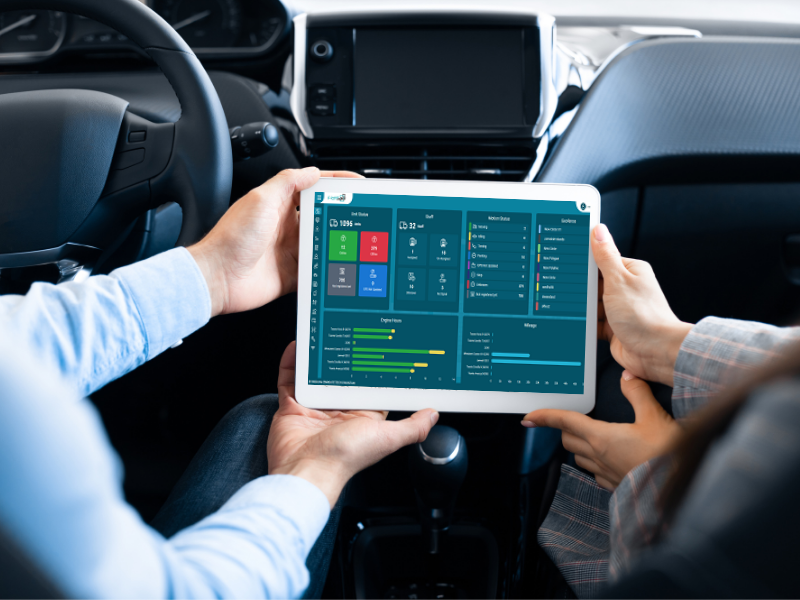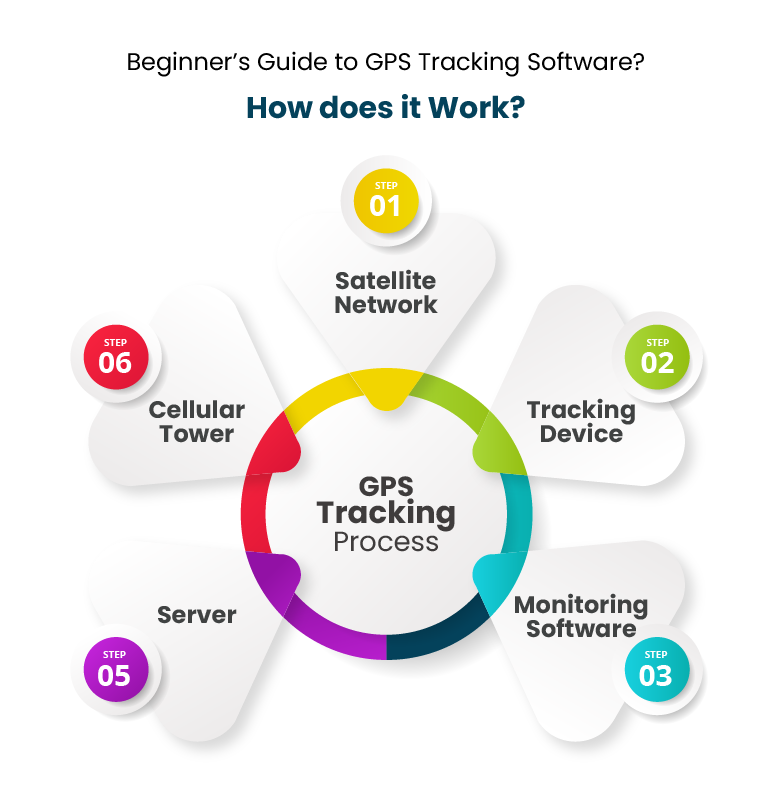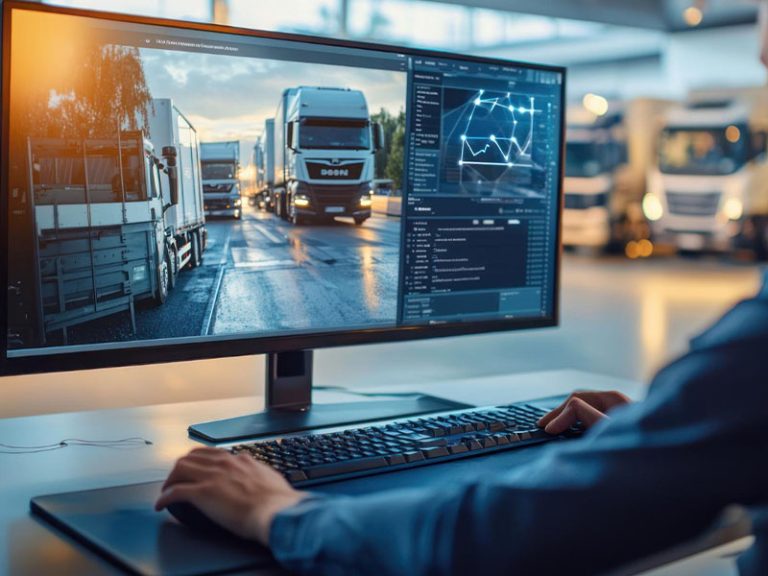Beginner’s Guide to GPS Tracking Software?

The transportation market has seen a remarkable increase in the past few years. With the concept of globalization becoming widespread, transportation activity is increasing globally. The transportation market has recovered pretty well after the sudden slump during the peak of COVID-19. From giant industries to ordinary people, everyone requires transportation. To cater to such a vast demand efficiently, transportation businesses rely on GPS tracking software.
Since the invention of the vehicle tracking system, fleet companies have seen an enormous increase in profitability. They offer operational control and higher productivity, resulting in better revenue generation. If you want to know complete details about the monitoring solutions, this blog will be a great help.
How does it work?
A GPS tracker works by using a GNSS (Global Navigation Satellite System) network. It is a network of a wide range of satellites that transmit microwave signals. The tracking devices capture these signals, and a process called Trilateration is applied to find out the location.
Trilateration measures the distance of the device from three or more satellites and finds the location at which the three signals converge. This way, the accurate location of the object on Earth can be calculated.
The GPS tracking process can be divided into several parts, and they are as follows:

Satellite Network: A satellite network contains a group of various satellites that send GPS signals towards the Earth. To get the accurate location of an object, signals from multiple satellites should be received.
Tracking Device: The tracker has a receiver that receives the GPS signals and sends them to a cellular tower.
Cellular Tower: A cellular tower receives the GPS data from the device and sends it to the internet server.
Server: The Internet server receives the information and transmits it to the monitoring screen.
Monitoring Software: The monitoring software shows the data sent by the device via the internet.
A GPS monitoring system allows tracking of an item (mainly vehicles) by using the Global Positioning System, helping manage its different aspects. For example, by attaching a tracking device to a vehicle, its ignition, motion status, location, and other details can be monitored.
Main Features of a Tracking System:
Although the features vary amongst monitoring solutions, some of the most common ones are as follows:
Real-time Tracking:
The primary feature of any monitoring solution is real-time location tracking. It helps the managers to monitor the motion status and the location of different vehicles within a fleet. Moreover, it allows them to make informed decisions by remaining aware of the latest activity status of the fleet.
Mobile Tracking:
Mobile tracking is an essential requirement to cater to the fast-paced needs of fleet operations. Modern solutions come with mobile phone apps for monitoring different activities on the go. You can download these apps on Android devices as well as iPhones.
Maintenance:
Without proper maintenance, a fleet can never remain sustainable. Therefore, a monitoring system should cater to the service and repair needs of a fleet. The modern software offers features like maintenance scheduling, real-time notifications, cost estimation for service and repair, etc.
Notifications:
Fleet managers have a busy routine, and monitoring every minor update becomes difficult. However, with real-time notifications offered by the GPS tracking software, they get important updates. From driver verification to alarm triggers, everything is notified via timely alerts.
Geofences:
Geofencing vehicle tracking is an integral feature in contemporary fleet management systems. It marks a virtual boundary of a specific area on the map to monitor the fleet activity within it. When a vehicle enters or leaves the geofence, a notification is triggered on the software. It is beneficial in ensuring safety.
Reporting:
In any industry, reporting is required to run smooth operations, and the same is the case with a fleet business. The vehicle tracking systems come with different reporting templates that allow you to access the required type of data. It helps analyze the performance of different areas and make data-driven decisions.
Remote Commands:
Modern GPS tracking software allows you to control the outputs of a tracking device remotely through commands. For example, you can send a power cut command to cut off the power supply to the engine in case of theft.
Similarly, you can send other customized commands according to your requirements to perform different functions on the vehicles.
Which Industries Use a GPS Tracking System?
The GPS tracking system is helpful for a vast number of industries. It helps businesses to control operational tasks efficiently and enhance productivity. Some of the leading industries availing the vehicle tracking system are as follows![]()
1. Courier and Delivery Services:
The delivery services involve transportation daily. From managing vehicle dispatch and driver allocation to ensuring timely delivery, there is a lot to handle. Therefore, a system is required that allows better management of the daily tasks, and GPS tracking software provides that. Managers can view the details of the drivers and the vehicles. They can monitor the vehicle’s movement on the map and view the delivery time.
All the leading delivery companies around the globe are using fleet management systems to get better results. A monitoring software ensures faster delivery, which results in better customer service. Therefore, the businesses not only achieve better efficiency but also establish goodwill with the clientele.
2. Logistics:
Logistics businesses usually contain large fleets containing a huge number of vehicles that regularly travel to transport goods. By deploying a fleet monitoring solution, a company can streamline its operations in various ways. For example, the managers can ensure that the consignment is following the correct route with real-time monitoring of the vehicle location. Similarly, driver monitoring allows for less idling, resulting in faster transportation.
There is a lower probability of accidents with excellent security features like driver identification, alarm systems, and route optimization. Moreover, the real-time notifications also provide quick updates that help counter an emergency immediately.
3. Construction:
The construction sector also relies heavily on GPS tracking software for better productivity. As there are many vehicles involved in the construction process, there is a need for a platform to monitor them. For example, trucks, excavators, or other construction equipment can be monitored 24/7 via monitoring software. From their daily usage to location, you can keep a check on everything.
Modern management solutions also come with a fuel monitoring feature to check the real-time fuel quantity. Fuel sensors can detect leakage and trigger notifications, enabling you to counter the situation quickly. Moreover, the fuel reports help analyze the consumption trends and fix the loopholes.
4. Public Transportation:
Transportation services like buses, trains, and ride-hailing apps use GPS tracking to prevent delays, ensure efficient communication with drivers, enable faster dispatch, and guarantee timely, safe arrivals for passengers.
![]()
Reduction in Fuel Expense:
Modern monitoring systems come with fuel sensor integration that allows managers to monitor the fuel levels 24/7. From the average consumption of the vehicle to leakage, you can check everything through the monitoring software.
Better Maintenance:
Fleet management software streamlines maintenance by scheduling timely service tasks based on mileage, engine hours, or dates, ensuring vehicles remain efficient and reliable.
Achieve Driver Efficiency:
Fleet managers can boost driver efficiency using GPS tracking software. It monitors trips in real-time, tracks routes, and alerts for harsh driving behaviors like sudden braking or speeding, helping prevent accidents and ensuring safe, efficient operations.
Automation:
Vehicle tracking automates fleet tasks like availability and fuel management, cutting paperwork and errors while boosting speed, efficiency, and overall operational control.
Safety:
Fleet safety is vital. GPS tracking prevents theft and crashes through driver ID, alarms, and behavior monitoring, ensuring authorized access, safer driving, and reduced accident risks.
Read Further: features and benefits of white-label GPS tracking software
The growing scope and demand for monitoring solutions promise many prospects. Let us discuss them in detail.![]()
Takeaway!
GPS tracking software for cars has become an inevitable need for all fleet businesses. They have become a necessity to compete in the competitive market. If you are also looking for an efficient monitoring solution to optimize your fleet efficiency, book a demo now.
Read More: How Does GPS Tracking Software Handle Real-Time Tracking
5. Takeaway Services:
Due to the growing need for convenience amongst the general public, businesses like takeaway services have seen a boom. It allows customers to order their favorite meal from home, and it will be delivered to their doorstep. However, if the delivery gets late, the customers can become discontented pretty quickly. A GPS tracking software comes into play to avoid such a situation. It helps the managers monitor the timely delivery and enables drivers to track their orders.
The route optimization feature lets the drivers select the shortest and clearest routes to reach their destination quickly. Driver monitoring keeps a check on the driver’s activity during the trip, ensuring safety and fuel efficiency.


